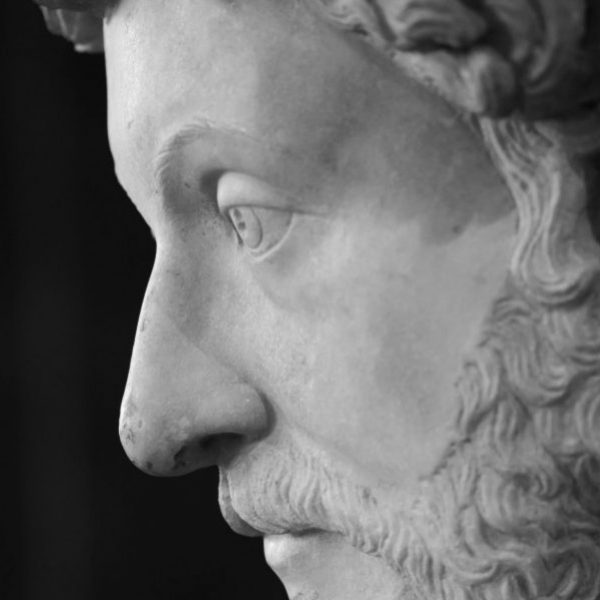Nigel Warburton on Immanuel Kant
 An excerpt from Nigel Warburton’s A Little History of Philosophy, a lively and accessible introduction to Western philosophy, bringing the ideas of the world’s greatest thinkers into focus. from Socrates’ questions about reality to Peter Singer’s thinking on the moral status of animals in our own times.
An excerpt from Nigel Warburton’s A Little History of Philosophy, a lively and accessible introduction to Western philosophy, bringing the ideas of the world’s greatest thinkers into focus. from Socrates’ questions about reality to Peter Singer’s thinking on the moral status of animals in our own times.
Nigel Warburton—
There’s a knock at your door. Standing in front of you is a young man who obviously needs help. He’s injured and is bleeding. You take him in and help him, make him feel comfortable and safe and phone for an ambulance. This is obviously the right thing ot do. But if you help him just because you feel sorry for him, according to Immanuel Kant, that wouldn’t be a moral action at all. Your sympathy is irrelevant to the morality of your action. That’s part of your character, but nothing to do with right and wrong. Morality for Kant wasn’t just about what you do, but about why you do it. Those who do the right thing don’t do it simply because of how they feel: the decision has to be based on reason, reason that tells you what your duty is, regardless of how you happen to feel.
Kant thought that emotion shouldn’t come into morality. Whether we have them or not is largely a matter of luck. Some people feel compassion and empathy, others don’t. Some are mean and find it difficult to feel generous; others get great enjoyment from giving away their money and possessions to help other people. But being good should be something that any reasonable person should be able to achieve through their own choices. For Kant, if you help the young man because you know it is your duty, then that is a moral action. It’s the right thing to do because it is what everyone in the same situation should do.
This may sound strange to you. You probably think that someone who felt sorry for the young man and helped him because of that would have acted morally and was perhaps a better person for feeling that emotion. That’s what Aristotle would have thought too (see Chapter 2). But Kant was certain. If you do something just because of how you feel that is not a good action at all. Imagine someone who felt disgust when they saw the young man, but still went ahead and helped him out of duty. That person would be more obviously moral in Kant’s eyes than someone who acted from compassion. That’s because the disgusted person would clearly be acting from a sense of duty because their emotions would be pushing in the completely opposite direction, encouraging them not to help.
Think of the parable of the Good Samaritan. The Good Samaritan helps a man in need he sees lying by the side of the road. Everyone else just passes by. What made the Good Samaritan good? If the Samaritan helped the man in need because he thought it would get him into heaven, in Kant’s view that wouldn’t have been a moral action at all. It would be treating the man as a way of getting something – a means to an end. If he helped him simply from compassion, as we’ve seen already, that would be no good in Kant’s eyes. But if he helped him because he recognized that it was his duty, and the right thing for anyone in those circumstances to do, then Kant would agree that the Good Samaritan was morally good.
Kant’s view of intentions is easier to accept than his view of the emotions. Most of us do judge each other by what each of us is trying to do, rather than just by what we succeed in doing. Think of how you would feel about being accidentally knocked over by a parent rushing to stop his young child from into the road. Compare that with how you would feel if someone else had deliberately knocked you over for fun. The parent didn’t intend to hurt you. The thug did. But, as the next example shows, having good intentions isn’t enough to make your action moral.
 There’s another knock at the door. You answer. It’s your best friend who looks pale, worried and out of breath. She tells you someone is chasing her, someone who wants to kill her. He’s got a knife. You let her in, and she runs upstairs to hide. Moments later there is yet another knock on the door. This time it is the would-be killer and he has a crazy look in his eyes. He wants to know where your friend is. Is she in the house? Is she hiding in a cupboard? Where is she? In fact she is upstairs. But you tell a lie. You say she has gone to the park. Surely you’ve done the right thing by sending the would-be killer out to look for her in the wrong place. You’ve probably saved your friend’s life. That must be a moral act, mustn’t it?
There’s another knock at the door. You answer. It’s your best friend who looks pale, worried and out of breath. She tells you someone is chasing her, someone who wants to kill her. He’s got a knife. You let her in, and she runs upstairs to hide. Moments later there is yet another knock on the door. This time it is the would-be killer and he has a crazy look in his eyes. He wants to know where your friend is. Is she in the house? Is she hiding in a cupboard? Where is she? In fact she is upstairs. But you tell a lie. You say she has gone to the park. Surely you’ve done the right thing by sending the would-be killer out to look for her in the wrong place. You’ve probably saved your friend’s life. That must be a moral act, mustn’t it?
Excerpted from Chapter 20: “What if Everyone Did That?: Immanuel Kant (2)” in A Little History of Philosophy, by Nigel Warburton. Copyright © 2011 by Nigel Warburton.





Absolutely LOVE Nigel Warburton, as far as I’m concerned the guys a renegade and a revolutionary when it comes to philosophy, snubbing the all-to-common temptation that plagues the discipline, now more than ever, to be pointlessly complex and esoteric in a pathetic attempt to try and appear more intelligent than ones audience. (Much like a holocaust movie guarantees an Oscar, surely talking more bollocks than Heidegger will cement you a place in the pantheon of legendary philosophers, right?). Warburton is not only a great starting point for newbies but a brilliant point of reference for anyone struggling to translate or interpret various works and/or concepts from a multitude of philosophers from pretty much any era. Think Bertrand Russell on steroids. I recommend the podcast he does with David Edmonds as well “Philosophy Bites”.